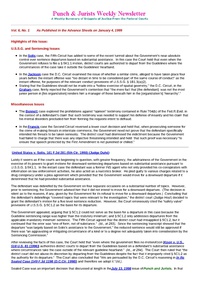The defendant in this case, a reputed member of a notorious gang in Washington, D.C., was charged with the usual variety of drug crimes. He was convicted and, at sentencing, the district court (Judge Jackson) imposed an “aggravating role” sentence enhancement pursuant to U.S.S.G. § 3B1.1. That enhancement was …
The Court affirmed a lower court decision to preclude expert testimony as to whether defendant' mental disorders “precluded him from forming the intent to defraud” on the grounds that such questions would elicit answers that would violate Rule 704(b).
This case is noted for its discussion of the …
The defendant in this case, Adolph Jackson, was arrested in a reverse sting operation that was masterminded by a drug lord, one Rayful Edmond, who was serving a life sentence in a Federal prison. Jackson pled guilty to possession of 10 kilograms of cocaine with intent to distribute. The …
The Court affirmed a lower court decision to preclude expert testimony as to whether defendant' mental disorders “precluded him from forming the intent to defraud” on the grounds that such questions would elicit answers that would violate Rule 704(b).
This case is noted for its discussion of the …
This case, and the Court's subsequent decision in U.S. v. Shabazz, No. 99-2388 (6th Cir. 8/30/2001), comprise a detailed analysis of the scope and meaning of the provisions of USSG § 2X3.1 - the accessory-after-the-fact Guideline.
Reversing a lower court decision, the 2nd Circuit held that in a prosecution under 18 USC § 875(c) the Government need not prove that a defendant specifically intended his threats to be taken seriously.
The defendant in this case was charged with making six threatening calls against the …
In this case, almost one year after the defendant's sentencing, the Sentencing Commission issued Amendment 500 which amended the application notes to § 3B1.1. According to the Commission, the amendment "clarifies" the operation of the section to aid the courts of appeals in applying it. See U.S.S.G. § 3B1.1, …
Lately it seems as if the courts are beginning to question, with greater frequency, the arbitrariness of the Government in the exercise of its powers to grant motions for downward sentencing departures based on substantial assistance pursuant to U.S.S.G. § 5K1.1. In the instant case the defendant was a …
Here the Court expressly overruled U.S. v. Fike, 82 F.3d 1315 and U.S. v. Brown, 102 F.3d 1390.
Here the en banc court held that an erroneous pre-Bailey instruction on the "use" of a gun during a drug traficking offense was harmless error, since the jury necessarily found …
En Banc decsion essentally affirming panel's decision that bias could not be presumed from jurors' knowledge of defendant's suppressed statements where none of those actually seated was challenged for cause or expressed fixed opinion about guilt.
In rendering its decision in this case [as well as in the …
In this case the Sixth Circuit also rejected the district court's supposition that even if Amendment 500 applied retroactively, the leadership enhancement applied to Jones because he had managerial control over the assets--in this case drugs--of the criminal enterprise. Thus, the enhancement could apply, the district court concluded, even …
